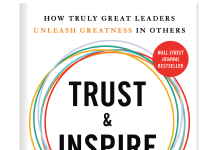Personal responsibility: Staying focused on what one can control directly—principally one’s own thoughts, words, and actions—and controlling one’s responses in the face of factors outside one’s own control.
The Gap
Manager: “Today’s young talent is too quick to make excuses; blame others; and complain about external influences, obstacles, and constraints.”
Second-wave Millennial (Generation Zer): “In my entry-level position, I often feel powerless in the face of so many factors outside my control.”
The Bridge: What You, the Manager, Need to Remember
Here is the reality: In any situation, there are factors beyond our control. For example, I feel gravity and time constantly hold me back! And in any situation, there are factors within our control: our own thoughts, words, and actions. Almost anyone can focus on those outside factors or those inside factors. In fact, there is a lot of evidence to suggest that most people—of all ages—have a tendency to point to outside factors beyond the control of the individual when explaining their own shortcomings and failures, not to mention the successes of others. Funny enough, most people also have a strong tendency to point to factors within the direct control of the individual when it comes to our own successes, as well as the failures and shortcomings of others. So at least the good news is that most people know how to focus on factors within the control of the individual. It’s just that we take our focus off those factors when we make excuses, blame others, and complain.
When it comes to teaching personal responsibility, the key is keeping the focus on factors within the control of the individual. Teaching them to ask themselves every step of the way: What is within my control right now? Where will I focus my attention and energy? What are my options? What’s the plan? What are my next steps? What are my next thoughts, words, and actions?
Make Them Aware/Make Them Care
This is the message I recommend managers deliver when they are trying to convince their young employees to really care about developing personal responsibility:
“No matter how high or how low your position, if you focus your attention and energy on factors outside your control, you will render yourself ‘powerless,’ by definition. However, the flip side is also true. No matter how high or how low your position, if you focus your attention and energy on factors within your control, you will maximize your power. In any situation, no matter how little is within your control, the way to make yourself more powerful is to focus like a laser beam on whatever thoughts, words, and actions you can take – your choices and the effects you can cause. Sometimes it is a very small amount of power – but more power is better than less power. The key is learning to ask yourself every step of the way: ‘What is within my control right now? Where will I focus my attention and energy? What are my options? What’s the plan? What are my next steps? What are my next thoughts, words, and actions?’ That’s how you increase your ‘response-power’ in any situation.”
Consider the following factors people in the workplace commonly list when asked to brainstorm factors that get in their way at work.
- Resource constraints—insufficient information, people, material, or tools
- Limited time
- Too much work
- Other people not doing their part
- Things are constantly changing
- Competing priorities
- Distance
- Weather
- Company policies, rules, regulations, and procedures
- The way things have always been done around here
- Too many low-priority distractions
- Interruptions
- Conflict between and among employees
- My manager is often unavailable
- Unclear lines of authority
- I answer to too many different people
- Inconsistency from one manager to another
I’m sure you can you think of recent examples of many of these. Think of one example of one of these factors you’ve experienced recently. It is easy to focus on the extent to which that factor outside your control constrained your options and left you powerless. Right?
Focusing on that moment—where it is easy to focus on the factors outside one’s own control—is the key to teaching young people to increase their sense of personal responsibility. In our career seminars with young employees, we ask them to think of examples of these factors outside their own control—examples within their own experience that have left them feeling powerless.
Then we teach them to ask themselves:
What did YOU do? (Usually the answer is “nothing”)
What could YOU have done differently in retrospect?
What were your options?
What thoughts, words, and actions could you have taken?
Next, we ask them to look ahead and ask another set of questions:
Can you anticipate this factor getting in your way in the future?
What will be outside my control?
What will be inside my control? (My own thoughts, words, actions)
What options might I have?
What concrete steps will I take to make the greatest contribution I can?
We call this set of questions “response power.” Learning to use “response power” is a powerful way to learn and grow when it comes to taking greater personal responsibility. The idea is to think about those times when it feels like “there really is nothing YOU can do” and then reframe those situations to focus on the fact that there is always “something YOU can do.”
Excerpt from “Bridging the Skills Gap: Teaching the Missing Basics to Today’s Young Talent” by Bruce Tulgan (Wiley, September 2015). For more information, visit http://www.amazon.com/Bridging-Soft-Skills-Gap-Missing/dp/1118725646
Based in New Haven, CT, Bruce Tulgan is a leading expert on young people in the workplace. He is an advisor to business leaders all over the world, the author or coauthor of numerous books, including the classic, “Managing Generation X” (1995); best-seller “It’s Okay to Be the Boss” (2007); “Not Everyone Gets a Trophy’ (2009); “The 27 Challenges Managers Face” (2014); and Bridging the Skills Gap (2015). Since founding management training firm RainmakerThinking in 1993, he has been a sought-after keynote speaker and seminar leader. Follow him on twitter @brucetulgan. He can be reached at brucet@rainmakerthinking.com.




